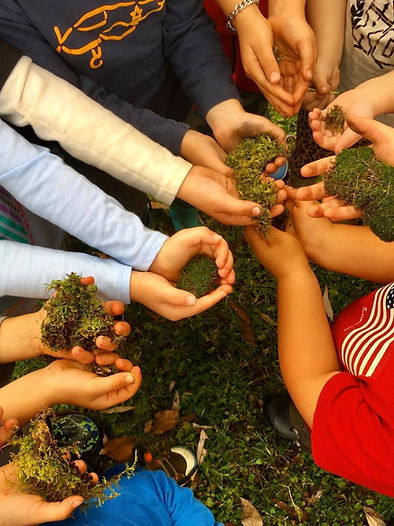
Read About Our Program
EMERGENT
Our curriculum is emergent, constructive and play-based. This means that classroom studies and projects often emerge from the children’s interests or from events in the daily life of the classroom community, and the broader natural world. For example, a focus on babies might be prompted by the birth of new siblings and the discussion and play themes the children share through this real-life experience. Children construct their own ideas and theories about their world through play, social interaction, and experimentation. Children might explore the properties of weight and motion by constructing ramps and rolling various objects; they learn much more through this hands-on experience than they would from an adult’s verbal explanation or demonstration of these principles. Teachers observe and plan carefully to provoke, enhance, extend and document children’s learning. It is the teacher's job to enlarge and enrich the topics of children's interest. An emergent topic may last a few hours or may be sustained over months, depending on the interests of those involved.
The teachers will share classroom activities and emergent themes with you through their curriculum plans and documentation—pictures and words—that will allow you to follow the classroom events as well as the learning process of both individual children and the group as a whole. Through our rich curriculum and stimulating classroom environments, children gain the skills needed for more formal learning in Kindergarten and beyond. Throughout the curriculum, children’s emerging interests in writing, reading and numbers are strongly supported and encouraged.
"The messier the better"
JB age 3

"Nature belongs to itself, and we belong to nature and we belong to ourselves"
AH, age 4
NATURE BASED

There is a growing body of research that links nature-based learning in early life with health and academic performance later in life.
Spending time in nature has a positive, rejuvenating effect on attention, executive function and mental processes: supporting the ability to access risks and problem solve, nature promotes more inventive and creative play. Nature has a positive effect on physical and physiological health: time in nature relieves stress, increases physical activity. Nature benefits mental health: contact with nature increases self-discipline , such as delayed gratification, and hyperactivity, and coping skills; time in nature increases a child’s engagement, promotes a greater sense of freedom, autonomy and joy. Nature supports social and emotional skill development: promoting an increased sense of connection to place, self and others, self-esteem and competence, increasing empathy toward others and the natural environment, and supporting the development of collaborative problem solving and critical thinking.
SOCIAL JUSTICE
At TICC, we believe children are capable, able and keen observers of the world around them. Bias based on gender, race, disability, sexual orientation, or social class can create serious obstacles to children's healthy development and to the overall development of our community and our world. We use an active approach to celebrate differences and to challenge prejudice. Children are encouraged to use their voices and to think critically and thoughtfully about their observations, relationships and actions in relation to the greater community. This philosophy is incorporated into everything we do at the center. We carefully examine the books and materials we use and create environments free of stereotypical images. We teach children that at Turtle Island it is not acceptable to exclude a person based on a personal characteristic. Our beliefs about a person are based on observation, not on stereotypical images. Other steps we take to promote an anti bias curriculum include: providing our staff with training on developing an anti-bias and culturally sensitive curriculum, responding to children's questions and comments about diversity in an open and straightforward manner and being aware and respectful of the diversity in our own community.


.png)